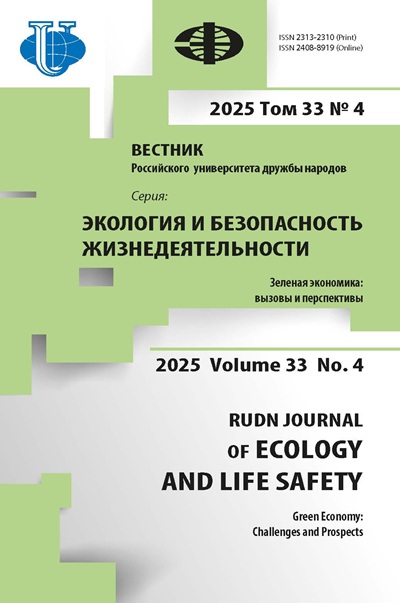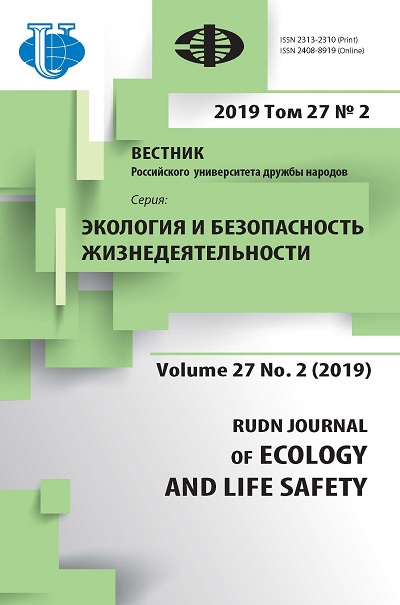Vol 27, No 2 (2019)
- Year: 2019
- Articles: 6
- URL: https://journals.rudn.ru/ecology/issue/view/1240
- DOI: https://doi.org/10.22363/2313-2310-2019-27-2
Full Issue
Geoecology
Cluster formation of ash and slag waters for production of building materials as a measure of environmental damage
Abstract
The most promising scheme of disposal of objects of accumulated environmental damage in the wastewater system is their joint incineration with solid waste to produce ash used as an additive in the production of building materials. The latter becomes a strategic resource in the implementation of the program of liquidation of objects of accumulated environmental damage. Various types of ash and slag obtained from the incineration of wastewater and municipal solid waste are analyzed. The data obtained give grounds to consider the use of ash from wastewater waste suitable for toxicological parameters, but also in view of positive foreign practice. This basis makes it possible to consider the formation of a cluster of joint incineration of waste to produce ash used as an additive in building materials. The results of the study indicate the potential effectiveness and timeliness in the implementation of the suppression of foci of accumulated environmental damage associated with landfills of solid waste through the formation of a cluster of joint incineration of waste for ash.
 91-104
91-104


Problems of polycyclic aromatic hydrocarbons studying in the waters of North-Eastern Caspian Sea
Abstract
The problems of studying the negative factors of oil and gas activity in the waters of the North-Eastern Caspian Sea are presented. Despite the active anthropogenic activity, the specificity of hydrocarbon pollution in this part of the water area is poorly understood. The approaches to the analysis of the qualitative composition and identification of sources of polycyclic aromatic hydrocarbons (PAHs) pollution based on the indicator ratios of kinetic and thermodynamic isomers are presented. These approaches make it possible to identify the source of pollution, but a full assessment requires taking into account the seasonal dynamics of the sta- tus of aquatic systems. Estimates of the migration features of PAHs and their definitions in the aqueous phase are given. The problems of transition and the study of polyarenes to bottom sediments are assessed. The issues of the degradation of PAH and oil products in the aquatic systems of the region are considered, recommendations are given to improve the development of the research base of the reviewed topics.
 105-116
105-116


Ecology
Assessment of recreational use of specially protected natural territories of Tatishchevsky district of Saratov region
Abstract
The influence of recreation being a set of measures to restore health and recreation, on the main components of forest phytocenoses in specially protected natural territories of the Tatishchevsky district of the Saratov region has been studied for the first time. These phytocenoses have been intensively used for tourism for a long time. The intensity and visits activity of protected areas has been determined; the recreational capacity of territorial objects has been studied. The degree of forest landscapes has been revealed in specially protected natural territories. The findings allow predicting the future state of the natural resources of the Saratov region and can be taken into account when assessing their optimal use.
 117-127
117-127


Experience of the monitoring of the littoral fish assemblages at reserved waters (on the example of the Karadag Nature Reserve aquatory, Crimea)
Abstract
Feasibility of monitoring of the littoral fish assemblages at the reserved water areas (Karadag Nature Reserve, Crimea) by methods of visual estimation and video recording involving data of fish catch statistics of fishing companies and recreational fishermen providing fishing in the waters adjacent to the reserved aquatory is discussed. At the water area of the reserve 18 species (35%) were identified exclusively by visual recording and video recording methods, 13 more species were identified by the mentioned contactless methods and simultaneously as a result of the analysis of information from recreational fishermen and fish catch statistics. As a result, 31 species of fish (or 61 % of the identified species) were identified visually or by video recording. The contactless methods were detected mostly sedentary (15) and nomad (11) species. Migratory species in the majority (9 species vs. 6) were identified only as a result of the analysis of information from recreational fishermen and fish catch statistics.
 128-137
128-137


Short announcements
Effects of electromagnetic radiation on the energy state of water molecules
Abstract
The impact of electromagnetic fields of both natural and man-made origin in public places and at work due to the growing tendency to use electronic devices can have an adverse effect on human health. This article proposes a possible mechanism for the action of electromagnetic radiation of low power on a living organism through a liquid medium.
 138-142
138-142


Environmental Economics
Commercial potential of linear Fresnel solar collectors in the industrial sector of Ecuador: preliminary assessment
Abstract
One of the crucial challenges faced by industry has been finding approaches that meet its increasing energy demand and decreasing reliance on non-renewable sources. Ecuadorian policies promote the use of renewable sources of energy; nevertheless, there is limited research on concentrated solar energy in the country. Therefore, this review article presents an overview on previous research on the description of linear Fresnel collectors for solar heat for industrial processes, promising Ecuadorian industrial branches for its application, and the solar resource available for this purpose in Ecuador. As a result of existing literature analysis, the manufacturing industry may be a key sector for the application of this technology, which could reduce the use of conventional energy sources, especially in the food industry located in the Andean region. The outcomes will contribute to future thorough research on the topic.
 143-153
143-153
















